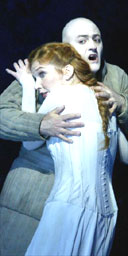
Posterity has not been very kind to Euryanthe. Weber's grand heroic-romantic opera, first performed in 1823 and composed to capitalise upon the phenomenal success of his Der FreischÀtz two years earlier, is recognised as a precursor of much that German romanticism in general and Wagner particularly developed from its seedling ideas and innovations.
But respect does not translate into popularity and the notorious weaknesses of Euryanthe's libretto, and the awkward corners of its plot, have long counted against it in performance.
Tastes change, however, and it would not be the first or the last score to become a latter-day success. Perhaps 21st century sensibilities can respond to this tale (based on a 13th century French romance) of a virtuous woman falsely accused of infidelity and abandoned by her lover more sympathetically than the 19th century, and Glyndebourne certainly deserves a pat on the back not only for trying to find out, but also for engaging a top team to present it.
Mark Elder, whose blazing concert performance of Euryanthe at the Queen Elizabeth Hall eight years ago was the first chance for most of us to hear the work live, conducts; Richard Jones, making his house debut, is the director, with designs by John Macfarlane.
All the stops are certainly pulled out. The Orchestra of the Age of Enlightenment is urged along by Elder at maximum horsepower and responds to Weber's sleights of orchestration with some outstanding playing; the woodwind and brass especially are dazzling. But whatever they do in the pit the drama refuses to take off - the virtues of the piece are mostly musical, often isolated, and when fully staged the fault lines are too obvious and the problems with the plot itself, especially Euryanthe's own strangely passive acceptance of the false accusations made against her, remain hard to swallow.
The designs, constantly moving and mutating, are massive and brooding - storm-wracked Caspar David Friedrich skyscapes, fantastical forests in which every tree trunk sprouts vicious spines, a frightened moon face that seems to represent Euryanthe's victimisation.
Anne Schwanewilms in the title role is the pick of the cast, really relishing all the challenges Weber's florid writing sets her; John Daszak as Adolar works hard, but lacks the vocal muscle to create something substantial. The villains - Eglantine (Lauren Flanigan) and Lysiart (Stephen Gadd, standing in for an indisposed Pavlo Hunka) do their best with two-dimensional beings; the excellent Clive Bayley has little scope as King Louis VI, but that goes for everyone.
· In rep until August 22. Box office: 01273 813813.

